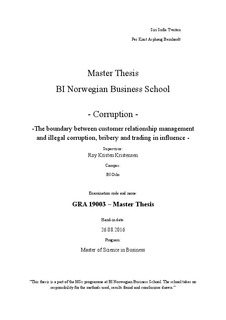Corruption ; The boundary between customer relationship management and illegal corruption, bribery and trading in influence
Master thesis
Permanent lenke
http://hdl.handle.net/11250/2443792Utgivelsesdato
2016Metadata
Vis full innførselSamlinger
- Master of Science [1621]
Sammendrag
The impropriety principle is a central legal standard that should be determined by the courts in light of the prevailing ethical and moral perceptions in the society. To decide whether an advantage is undue, the preparatory work mentions some factors that should be part of the assessment: the economic value of the advantage, the giver and receiver’s positions and their relationship, whether there is a public official involved, the purpose of the advantage, whether there has been transparency, whether internal guidelines or business practices have been breached, and finally the fundamental value behind the clause. The deed would also have to be clearly blameworthy1.
It seems as though the element that is emphasized by the court is whether the active briber intends to influence the passive briber. If an advantage is meant to influence the receiver it would naturally be perceived as an undue advantage. This is illustrated in the verdict where a man tried to bribe two police officers with 500 kroner, and was convicted of corruption2. The same is illustrated in the Ruter verdict3, where the operations manager was acquitted among other because he could prove that the dinners were not treated to influence him. A similar argument is found in the Unibuss case4, where a defendant received “undue advantages”, but was not a decision-maker and consequently could not reciprocate.
Since the changes in the Penal Code in 2003 corruption in the private and the public sector has been punishable by the same clause, § 276 a (continued as § 387 in the 2005 Penal Code), but there is still a practical difference to the two. As illustrated in verdicts such as the Ruter verdict, Unibuss and the Ullevål case5 situations involving public means or people representing public companies are subject to stricter moral standards and regulations. This means that not only public officials directly, but also people with similar positions of power and people managing public means, can be subject to the same standards as public officials.
Trading in influence and corruption are two quite similar offenses, yet the maximum penalty for trading in influence is 3 years imprisonment, while gross corruption can be penalized by 10 years imprisonment. The difference between the two is therefore important to notice. The offence is described similarly in the legislation; however trading in influence involves a third party that might not even know that he is involved. Sordid corruption is when you bribe someone to influence them, while when guilty of trading in influence, you bribe someone to influence an external third party. In the Yara verdict the court stated that a situation cannot necessarily be characterized as trading in influence when the advantage is not paid directly to the decision maker. Corruption also includes indirect advantages, cf. the wording “for himself or others” in the Penal Code § 276 a (§ 387 in 2005 code)6. The real difference between trading in influence and sordid corruption is not in the assessment of the impropriety principle, but rather which group of people it applies to.
The Taxation Act forbids deduction for both representation and bribes, and therefore there is no clear distinction between the two7. We find that the lack of a clear boundary might not be problematic according to the Taxation Act, however it constitutes a problem when businesses are trying to avoid the “grey area” according to the Penal Code. Customer relationship management can be crucial for many businesses, and better guidelines on the matter may prevent many of the minor cases of corruption. This view is supported by NHO8.
Facilitation payments have not been mentioned much in the preparatory work to the Penal Code, and according to the OECD convention the members are only obliged to incriminate facilitation payments by or towards foreign public officials. In the preparatory work the Department has stated that facilitation payments are to be considered as corruption as long as the advantage given in “undue”. That is, the legal standard in § 387 applies. When deciding whether the advantage is undue, one should also consider whether the situation can be categorized as black mail. In that case legal action should be made with caution9.
Based on our findings, we have made a practical guide on where the line is drawn relating to different scenarios in chapter 12 in this paper. It is important to note that this is just an indication based on preparatory work, jurisprudence and other legal theory, and that it is only the court that can decide whether an advantage is undue or not.
Beskrivelse
Masteroppgave(MSc) in Master of Science in Business, Business law, tax and accounting - Handelshøyskolen BI, 2016
